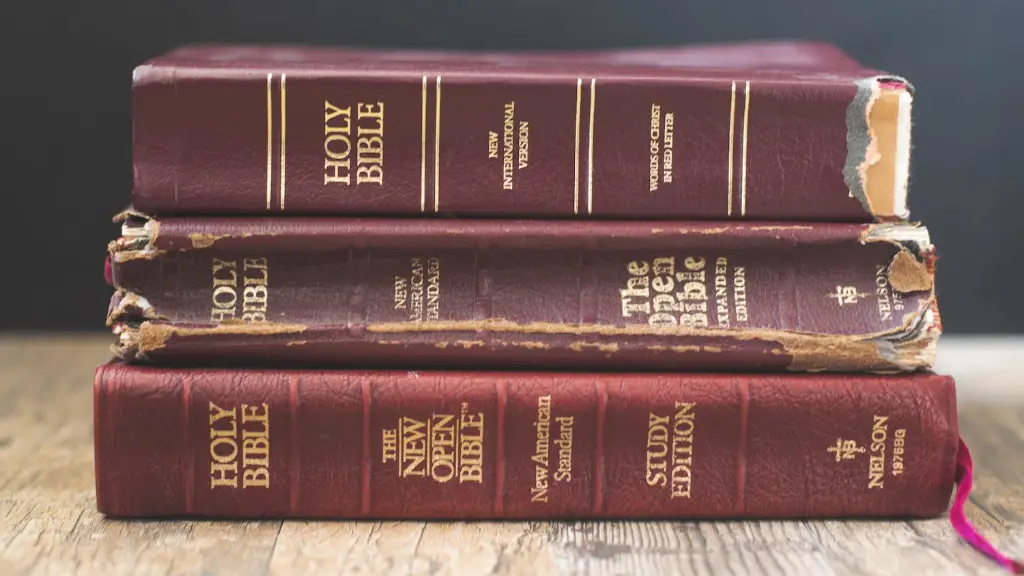During the time of Ancient Israel, the Levites were a special class of people who served a specific role within the structure of Temple worship and responsible for the synagogue and temple services. They are mentioned often in the Bible, appearing in several books, including Leviticus, Numbers, Deuteronomy, Joshua, 1 and 2 Samuel, 1 and 2 Kings, 1 and 2 Chronicles and Psalms. The Levites were a hereditary priesthood, descended from the lineage of Aaron, descendent of the Tribe of Levi.
The Levites were considered a distinct people, set apart from other tribes of the house of Israel. It was the Levites’ duty to represent the peoplebefore the Lord and to minister to Him in all religious matters. They were responsible for taking care of the sacred vessels in the Temple, for slaughtering animals for sacrifices, for mixing incense, and for burning offerings to God. They were also involved in teaching the law in the synagogue and performing liturgical music during services.
The status of the Levites within the Israelite community was quite high. They were the only tribe who was not given a territorial allotment in the Promised Land, and were instead given cities in which to settle and live. They were assigned an eighth of all tithes offered to the Lord and, in turn, gave a tenth of their tithe to the priests. As a special reminder of the importance of their service and offering of sacrifice to the Lord, the Levites were served a double portion of manna in the wilderness following their departure from Egypt.
The Levites played a major role in the religious life of the Israelites and it was they who were officially charged with officiating the sacrifices and rituals of the Temple. This role meant that the Levites were considered to be carefully instructed and trained and held to high standards of worship and obedience to God’s commands. They were also expected to serve as spiritual advisors to the people and as living examples of holiness in the community.
Furthermore, it is believed that the Levites may have served as judges or jurors in the courts of Israel. The Bible refers to many ways in which they were involved in the administration of justice, as well as in the enforcement of laws and regulations. They were also given a permanent share in the offerings of the people, both by way of tithe and of voluntary offerings. They were deployed in prominent roles of public worship, and although their actual duties varied from tribe to tribe, it can be asserted that the Levites served an integral role in the religious, political and social life of ancient Israel.
The Tribe of Levi Today
Today, there is no formal “tribe of Levi”, in the sense that it existed in antiquity. This may be due to the historical events that led to the dispersal of the tribes of Israel. Nevertheless, Levites circle the world, who serve as modern-day spiritual descendants of Aaron and are highly respected for their commitment to the continued practice of Biblical laws and rituals.
Orthodox Jews believe Jewish law, known as Halakha, to be the most accurate and binding form of the law of God. This law is based on the Torah, and the Levites continue to interpret and teach the law to people of all traditions. There are also Christian Bibles that make mention of the Levites and their significance, and some of the Levitical rites and offerings prescribe by the Bible are still practiced to this day.
Today’s Levites often cite the spiritual example set by their biblical forebears, in their earnest desire to live a life devoted to their Creator. The modern Leviim take inspiration from the ancient Levites, committed to pursuing peace, justice and compassion for the Jewish people and for the world.
Biblical Significance of the Levites
The Levites were important to the people of ancient Israel for many reasons. The patriarchs of the Tribe of Levi, Moses, Aaron and their descendants, were the only ones who could directly commune with God and offer sacrifices and offerings on Israel’s behalf. As priests, they undertook the regulation of the religious cult and purified the Temple and its vessels. They were considered the mediators of the covenant between God and his people and thus had a special place of authority among the Children of Israel.
The Levites were also decorated with symbols of their office: a sacred vestment, a breastplate and a ephod, in which were placed the Urim and Thummim. This garment set them apart from the rest of the people, instilling in Israel an awareness of the holiness of God and the specialness of his worship.
The Levites were master ritualists, filled with understanding of the legal tradition given to them. They served as both teachers and models of the faith, performing their duties faithfully and imparting the sacred knowledge to the people. Today, their legacy continues to live on in their spiritual descendants, continuing their work of teaching and instructing the people of the Lord.
Role of Rituals and Sacrifices
The role of the Levites was also to serve in a sacrificial capacity, offering animal sacrifices to atone for sin and as an offering of thanksgiving to God. In addition, there were many other rituals that the Levites performed, such as burning incense, the blessing of the people, and the carrying out of special ceremonies at various times. It was these rites and sacrifices that kept the Israelites in touch with their spiritual heritage and ignited a spiritual connection between them and God.
The Israelites understood the Levites’ role as “priests of the Lord” and treated them with great courtesy and respect, for their work as mediators between God and the people was highly revered. The Levites presented offerings to God on behalf of the people, a job that only they were fit to do, since they were considered to be in a more intimate relationship with Him.
Moreover, the Levites were responsible for conveying the religious laws and teachings of the Lord to the rest of the nation. They were considered masters of the sacred law and were revered as teachers of truth, gently reminding the people of their obligation to God and showing them the right path. As religious and political leaders, the Levites wielded considerable influence in ancient Israel.
Religious Practices of Today
The Levites’ legacy lives on in modern times. Though their role of offering animal sacrifices has ceased for the most part, their devotion to the Lord and deep understanding of Biblical law continue to be important to all religious practices today. They continue to influence liturgical music and literature, as well as prayer and meditation. In addition, they foster devotion among people, an important contribution to the world of religious worship.
Though their place and function has evolved over time, the Levites remain a crucial part of Christianity, Judaism, and other religious movements. As instructors in the laws, rituals, and traditions of faith, they have provided invaluable guidance and insight in the practice of religion. In this way, their relevance continues to be felt and their contributions to the world of faith continue to be appreciated.
Links to Other Religions
The significance of the Levites reaches beyond the realms of the Christian and Jewish faiths. Their influence can be seen in many other faiths, from Roman Catholicism and Hinduism to Islam, Buddhism and many more. While there are many differences in the beliefs and practices of these various religions, the role of the Levites serves as the common thread linking them all together. The guidance and insight of the Levites has been a major contributor to the development of beliefs and rituals in many different faiths.
In this way, the Levites’ legacy goes beyond the ancient Israelite people and reaches across centuries and around the world. The contributions of the Levites to the practice of religion echoes through time and carries forward the religious teaching of the Bible, the shared value of faith in the one true God and the understanding of the sacred laws He gave us.
Impact of Levites on the Modern World
Though the Levites do not exist in the traditional form as they once did in Ancient Israel, their legacy remains as strong as ever. The guidance and wisdom of the Levites have been integral in the development of religious beliefs and practices throughout the world.
Moreover, some of the other principles that have been attributed to the Levites in the past, such as justice and compassion for those in need, remain relevant and important today. Though their official function may have diminished, the influence of the Levites can still be seen in the modern world, from their continuing presence in religious services to their continued stance as spiritual guardians in many faiths.
The Significance of the Tribe of Levi in Modern Times
Though the Tribe of Levi no longer exists in its ancient form, the significance of its role in the Bible and religious practice continues to be felt in modern times. The Levites served an important role in the religious life of the Israelites and their teachings are still respected today.
They continue to inspire and guide people in their faith and their legacy lives on in the many ways they have contributed to the development of religious beliefs and rituals. The influence of the Levites can be seen in many of the practices and beliefs within Christianity, Judaism and other faiths. As spiritual descendants of the Levites, modern followers of various faiths are able to emulate their example by striving for justice, love, peace and a deep devotion to the Lord.
Impact on the Future of Religion
The legacy of the Levites will continue to influence religious practice for generations to come. Their teachings, traditions and wisdom remain intact even today and are still respected and cherished throughout the world. As spiritual guides, they provide an important message of love, compassion and justice and in this way, they support and strengthen religious practice as it exists today and in the future.
The ancient Levites continue to inspire people to pursue the spiritual path of peace and love. By cherishing the memory of the Levites, we are able to continue to explore their relevance to the modern world and better understand the principles of faith they espoused and the spiritual traditions they fostered.





